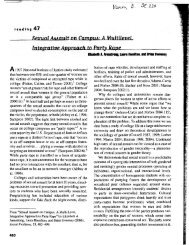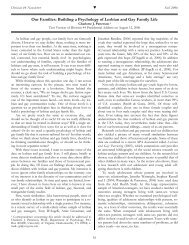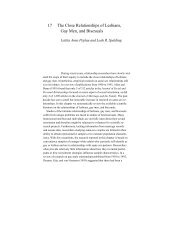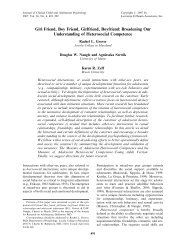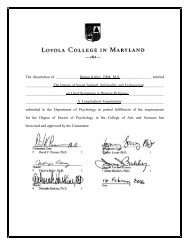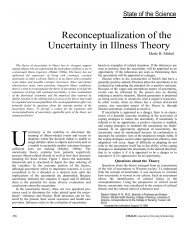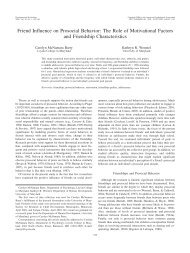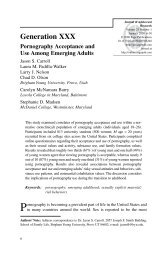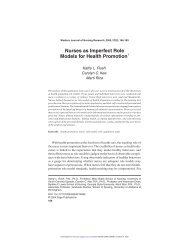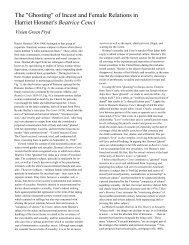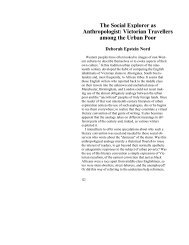I See Satan Fall Like Lightning
I See Satan Fall Like Lightning
I See Satan Fall Like Lightning
Create successful ePaper yourself
Turn your PDF publications into a flip-book with our unique Google optimized e-Paper software.
150 151<br />
to be true today: all our ideas about humankind, all our philoso-<br />
phies, all our social sciences, all our psychological theories, etc.<br />
are fundamentally pagan because they are based on a blindness to<br />
the circularity of mimetic conflict and contagion. This blindness is<br />
similar to that of mythical-ritual systems.<br />
The Passion accounts, allowing us to understand the single vic-<br />
tim mechanism and its mimetic cycles, enable us to find and identify<br />
our invisible prison and to comprehend our need for redemption.<br />
Since the "princes of this world" were not in communion with<br />
God, they did not understand that the victim mechanism they un-<br />
leashed against Jesus would result in truthful accounts. If they had<br />
been able to read the future, not only would they not have en-<br />
couraged the Crucifixion, but they would have opposed it with all<br />
their might.<br />
When the princes of this world finally understood the real import<br />
of the Cross, it was too late to turn back: Jesus had been crucified,<br />
and the Gospels had been written. Thus Paul is right to affirm: "If<br />
the princes of this world had known [the wisdom of God] they would<br />
not have crucified the Lord of glory." Western theology, in rejecting<br />
the idea of <strong>Satan</strong> tricked by the Cross, has lost a pearl of great price<br />
in the sphere of anthropology.<br />
Medieval and modern theories of redemption all look in the di-<br />
rection of God for the causes of the Crucifixion: God's honor, God's<br />
justice, even God's anger, must be satisfied. These theories don't<br />
succeed because they don't seriously look in the direction where the<br />
answer must lie: sinful humanity, human relations, mimetic conta-<br />
gion, which is the same thing as <strong>Satan</strong>. They speak much of original<br />
sin, but they fail to make the idea concrete. That is why they give<br />
an impression of being arbitrary and unjust to human beings, even<br />
if they are theologically sound.<br />
Once we identify the bad contagion, the idea of <strong>Satan</strong> duped<br />
by the Cross acquires a precise meaning that the Greeks obviously<br />
sensed without succeeding in articulating it in a completely satisfy-<br />
ing fashion. To be a "child of the devil" in the sense of the Gospel of<br />
John, as we have seen, is to be locked into a deceptive system of mi-<br />
metic contagion that can only lead into systems of myth and ritual.<br />
Or, in our time, it leads into those more recent forms of idolatry,<br />
such as ideology or the cult of science.<br />
The Greek Fathers had it right in saying that with the Cross<br />
<strong>Satan</strong> is the mystifier caught in the trap of his own mystification.<br />
The single victim mechanism was his personal property, his very<br />
own thing, the instrument of self-expulsion that put the world at<br />
his feet. But in the Cross this mechanism escapes once and for all<br />
from the control <strong>Satan</strong> exercised over it, and as a result the world<br />
looks completely different.<br />
If God allowed <strong>Satan</strong> to reign for a certain period over human-<br />
kind, it is because God knew beforehand that at the right time<br />
Christ would overcome his adversary by dying on the Cross. God<br />
in his wisdom had foreseen since the beginning that the victim<br />
mechanism would be reversed like a glove, exposed, placed in the<br />
open, stripped naked, and dismantled in the Gospel Passion texts,<br />
and he knew that neither <strong>Satan</strong> nor the powers could prevent this<br />
revelation.<br />
In triggering the victim mechanism against Jesus, <strong>Satan</strong> believed<br />
he was protecting his kingdom, defending his possession, not realiz-<br />
ing that, in fact, he was doing the very opposite. He did exactly what<br />
God had foreseen. Only <strong>Satan</strong> could have set in motion the process<br />
of his own destruction without suspecting anything was wrong.<br />
All we need to make the thesis of <strong>Satan</strong> duped by the Cross<br />
intelligible is a clear definition of what imprisons human beings in<br />
the realm of <strong>Satan</strong>: mimetic contagion and its outcome in the victim<br />
mechanism have provided us with that definition. We should not<br />
conclude that to identify the truth is enough to liberate us from the<br />
lies in which we are all imprisoned.<br />
The apostle Paul's text, from which I took the sentence that I<br />
just commented on, is the expression of extraordinary inspiration.<br />
Paul there intuits the existence of a divine plan that bears on all of<br />
human history, but he cannot quite formulate it. He goes into what<br />
may almost be called "ecstatic stammering" for lack of a language<br />
that could perform the task. He evokes



